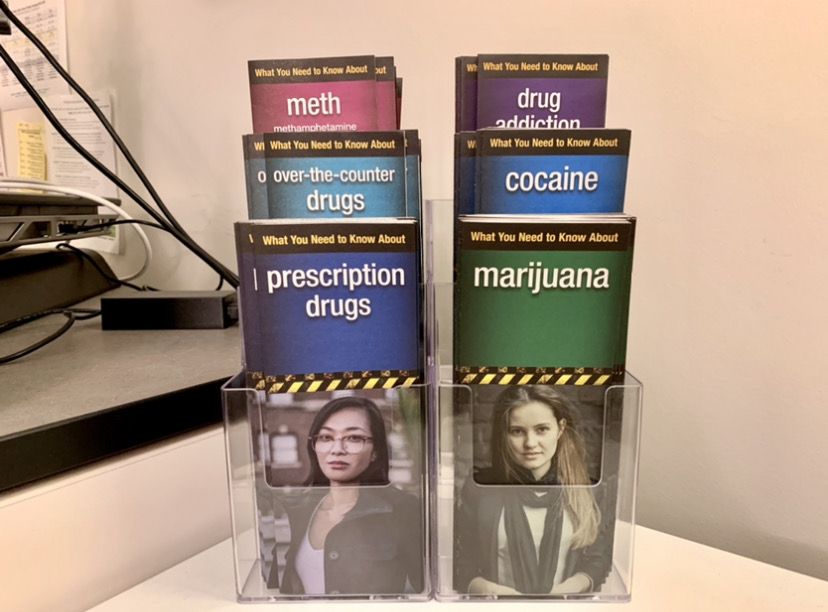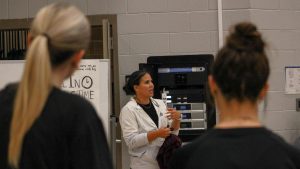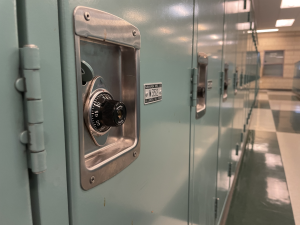Mind against body: How one student managed to escape his drug addiction
Brochures about student drug abuse in the dean’s office here at Fossil
November 1, 2021
At only 17 years, John (name changed to protect identity), now attending a local high school, was facing mental and physical challenges most of us can’t even imagine. When he was 15 years old, he got addicted to numerous dangerous drugs and barely managed to escape the deadly pull before it was too late. He is anything but proud now of his past, but he wants to tell his story to spread awareness and help other teenagers never get into that situation.
“I wish for no one to have to go through that”, John said.
“I remember the day it started very well.”, he said. “It was summer 2019, me and my friends smoked weed, nothing went wrong. Now I wish I had never done that.”
Because of their brain development, Teens are more likely to see the social benefits to drug use rather than the negative effects. For almost one year, John saw no problems with ‘just’ the weed he was smoking regularly.
Then, the country went into lockdown. Cut off from his friends he was forced to spend most of his time alone like many others. He struggled with his mental health.The things that had made him happy before and produced natural serotonin like spending time with his friends were taken away from him so abruptly that he saw no other way to help himself.
“Nothing else made me happy anymore. So I started smoking a lot of weed”, John said. He said that if lockdown had not been there, everything would have been very different.
If you or someone you know is experiencing a mental health or substance use problem, there are several resources available to help. At fossil, you can talk to teachers or counselors you trust. 1-800-487-4889 (SAMHSA’s National Helpline) and 1-800-950-6264 (NAMI helpline) are available 24/7 to talk about and help with mental health struggles confidentially and for free; the national suicide prevention lifeline is 1-800-273-8255.
At the end of the summer, August 2020, there was still no end of the for John devastating time of lockdown in sight and the Marijuana was not working anymore.
“It was just not enough to make me feel anything. So I started looking into other stuff. When my dealer offered me MDMA, I took it. That’s where it got really bad”, he said.
MDMA, also called Ecstasy or Molly, drastically increases Dopamine and Serotonin, the so-called “Happy-Hormones”, in a short period of time. It acts in the reward system of the brain to reinforce behaviors. That makes it highly addictive and so dangerous, because the brain starts to get used to those unnaturally high levels of Happy-Hormones and wants to stay on them. MDMA is one of the most popular ‘hard’ drugs among teenagers because of the short-term effects like increased energy. Those usually last 3-5 hours, but the crashes can last for days.
“MDMA feels like a party. I loved taking it. But the crashes that came after the highs were so terrible that I just wanted to stay high,” he said. Even though John was experiencing physical and especially mental side effects like sweating, anxiety, sleep, and memory problems, he kept going from high to high.
“Oh gosh, taking MDMA is one of the worst things you can do,” John said, reflecting back now.
An MDMA addict usually takes 300 mg of the drug per week. “I took 300 mg a day”, he said. “After three weeks, I crashed. I overdosed. Worst night of my life.”
It was his 16th birthday, and John woke up that night with a temperature of 106℉ and started hallucinating strongly. He was disoriented, dehydrated and sweating excessively. John was terrified of what was happening and started to panic. High doses of MDMA can affect the body’s ability to regulate temperature. This can result in liver, kidney, or heart failure and even death. “I saw people in my bedroom that were trying to kill me. I was freaking out. It was so real.”
His bedsheets were drenched in sweat the next morning and his temperature at 107℉. “I still thought to myself ‘You have to go to school’ and I tried and walked out of the house”, John said. But his parents refused to let him. He was sweating so much while doing this that his clothes were wet. They thought it had to be COVID-19 and brought him to a hospital. Although the doctors asked him repeatedly, he refused to admit to taking drugs. Finally, after being taken away from his parents, he did, and that probably saved his life. 2.4 gallons of fluid had to be pumped into his system and he spent three days in the hospital. Even after that, his vision was still hazy for a while.
“They told me that if I had gone to school that day, I would have fallen unconscious and died”, he said.
First, John continued to lie to his parents about his condition, but eventually, he had to tell them what was going on.
“I remember my mom started crying. That was not a great feeling. She was close to burying her own son.”
Two weeks after the overdose, he started taking drugs again. It was codeine, random pills out of the bathroom cabinet or horse tranquilizers, to avoid the crash. “After the high of the overdose, I was incredibly low for the next two months and I couldn’t bear that,” he said. So in October 2020, he took cocaine for the first time.
“It got really, really bad. Mainly because I didn’t see anyone except my parents, I just had the drugs.” With constantly abusing highly addictive drugs like cocaine, because that was “the only thing that made him get out of the low and feel good”, the physical side effects came. He started shaking and couldn’t sleep. “I got angry with my parents all the time, started shouting and screaming. I had never done something like that before,” John said.
“Cocaine was by far the worst. Once you’re on it, you try to get every piece of it you can, you do everything.” Everything, including stealing money from his parents. “I ran out of money and nobody would lend me money anymore, so I took it from my parent’s wallet at night. That is the worst feeling imaginable, but I couldn’t think, I had to do it.”
Although he felt miserable and ashamed about what he was doing, John just could not stop. Often, he bought new drugs the same night with that money to stay on the high, sometimes twice a day, in fear of the crashes.
“I remember being at the ATM, putting my Pin in, thinking ’this is wrong, you shouldn’t do this’, but I physically couldn’t stop myself,” he said. It was a fight of his mind against his body as he started to realize how addicted he was. Later, when his dad asked him why all the $1,400 from his bank account were gone, he told him he had spent it on video games. In total, he estimates he spent over $4,000 on drugs in two years.
“I’ll never really stop being addicted to cocaine; it gets easier to control, but you never get away from it”, said John, even though he is clean now.
“Because of my bad reputation, I only had two close friends left, but they were really disappointed in me. They knew, but didn’t try to stop me, because they knew they couldn’t. I think part of my problem was that there was no one that said ‘I’m there for you’”. He remembers thinking at the beginning of 2021 that if someone offered him Heroin, he would take it.
Then, one time in March 2021, his dealer had something new for him, and John was feeling so desperate that he took it.
“I did crack. And I drank a whole bottle of gin with it, 24 OZ.” Mixing crack and alcohol triggers the liver to produce a toxic and deadly chemical, cocaethylene, that is damaging the body heavily.
“I woke up in the middle of the night, choking on my own vomit. I was so lucky I fell on my floor at a weird angle, or I would have died. After, I remember thinking that was the lowest point I would ever get to.”
The thing that saved him was moving.
“That was the one hope I had, that everything would get better”, he said. With this hope in mind and after that last overdose, he slowly started to get better until they moved. Of course, it was not easy to just stop taking drugs, even at the new place.
“I used to text my old friends, begging them to get me anything.” Although he was desperate, they didn’t give in, and eventually, it got better. The strong desire his body had got easier to control. It was a fight he had to fight against his own body every day over and over again, but John made it. He has found new friends and hobbies to keep him busy, which was important and helped a lot. Now, he has mostly recovered physically.
“I never, ever want to go back. I would prefer any day here over the entire time there”, he said. “I can finally see myself truly smiling in pictures, not with my face completely gone.” That means a lot to him. Looking back, John regrets everything he has done regarding drugs, but he knows it was his mistake and owns it. He paid everything he owed back and takes responsibility.
“I know I can’t prevent people from taking drugs, but please, try to say no. Do all the research you can. Look what happened to me. It was torture. I almost died. And every one of my friends would have had to deal with that. Please talk to people about how you’re feeling and what you’re doing. Please be safe.”
If you or someone you know is struggling with substance abuse, it is important to talk to someone and get help as fast as possible. Free, 24/7 available and confidential hotlines to call are for example 1-800-662-4357 (SAMHSA’s National Helpline) and 1-866-761-0669 (Teen drug addiction hotline).







